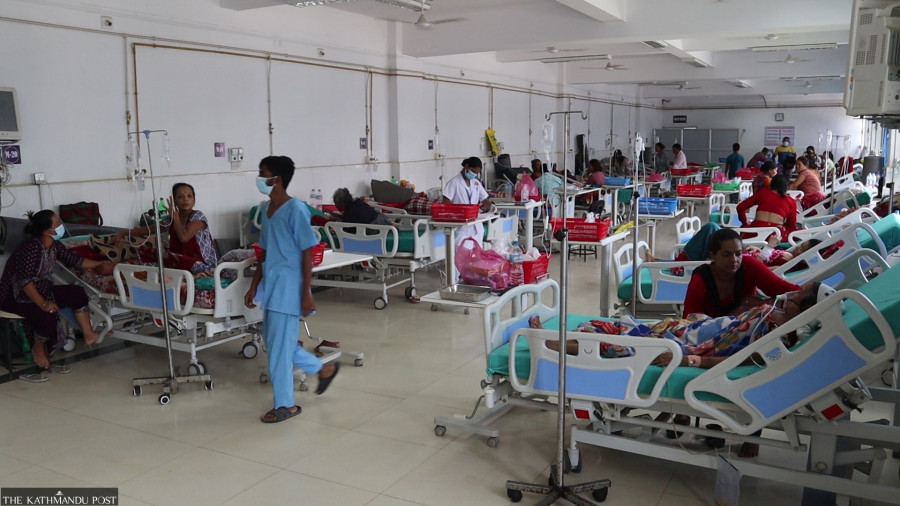Health
Comorbid people at high risk of dying from dengue infection
Doctors in affected districts say the official death toll is an underestimate.
Arjun Poudel
As the spread of the dengue virus in the country continues unabated, concerns are growing over the safety of the people with compromised immunity and chronic diseases.
According to the latest data provided by the Epidemiology and Disease Control Division, at least 10 people including two children have succumbed to the disease this year.
Two additional deaths are being verified and several other deaths from the infection reported in the media are yet to be officially listed at the division.
“Only two out of 10 confirmed deaths were primarily blamed on dengue infection,” said Dr Gokarna Dahal, chief of the Vector Control Section at the division. “Other people, who succumbed to the disease, had underlying conditions.”
Doctors serving dengue patients in the highly affected districts including Sunsari said that the number of deaths of the infected patients has been grossly underestimated.
They said that they are asked to differentiate between deaths exclusively from dengue infection and deaths of those having compromised immunity and chronic diseases.
“If we try to find an underlying condition for every dengue death, we could find one in each patient,” a doctor serving at the BP Koirala Institute of Health Sciences told the Post from Dharan asking not to be named, as he is not authorised to speak to the media. “We should not forget that people with underlying conditions can survive for long with timely treatment. If such people get infected with the dengue virus and die, dengue infection should be held responsible for such deaths.”
Dengue is a mosquito-borne disease transmitted by female Aedes aegypti and Aedes albopictus mosquitoes. The same vector also transmits chikungunya, yellow fever, and Zika, according to the World Health Organisation.
The virus serotypes DENV-1, DENV-2, and DENV-3 have been found responsible for the dengue epidemic in the country. There are five serotypes of dengue, numbered 1 through 5.
Officials at the division informed that over 13,000 people have been infected with the dengue virus that has spread in 74 out of 77 districts throughout the country. Most of the cases of infection have been reported since June, officials said.
Experts say the lackadaisical approach of the authorities concerned is responsible for the ongoing spread of the dengue virus.
“Neither the general public nor authorities concerned seem serious about the risks of infection and its consequences,” said Dr Sher Bahadur Pun, chief of the Clinical Research Unit at Sukraraj Tropical and Infectious Disease Hospital. “Measures needed to contain the spread of the dengue spreading vector have not been strictly enforced.”
Doctors say extensive measures—dengue search-and-destroy and awareness drives—should be launched to contain the spread of virus-spreading vectors.
Meanwhile, doctors at the BP Koirala Institute of Health Sciences said that the number of cases have started to slowly decline.
“Caseload of dengue patients has declined in our hospital,” said Dr Jagat Narayan Prasad, director at the hospital. “Many people may be getting treatment at home but the number of patients seeking treatment at the hospital has declined.”
Earlier, the hospital had been overwhelmed by the huge flow of infected patients. Ailing patients were treated off the floor of the hospital as beds in the emergency ward, Covid ward, observation wards and several other departments were occupied by dengue patients.
Last year, 88 people died and more than 54,000 were infected with the virus, which had spread to all 77 districts of the country. Hospitals in Kathmandu Valley were overwhelmed with dengue patients and many complained that they were deprived of treatment. At the time, pharmacies had run out of paracetamol, the most widely used medicine to treat fever.
The dengue outbreak in 2019 killed at least six people and over 16,000 were hospitalised. The virus had spread in 68 districts at the time.
The post-monsoon time is considered the peak season for dengue transmissions, but the country had already witnessed outbreaks of the potentially deadly disease since the start of the year. Experts say the virus has become endemic with cases of dengue reported throughout the year.
Experts say unless the lessons learnt and experiences gained in the previous outbreaks are implemented, the disease will not stop spreading. They reckon the real number of infections could be several times higher as the government’s case reporting system is not very effective and more than 80 percent of the cases are asymptomatic. Many people infected with dengue show mild symptoms and do not need any treatment or can be treated with paracetamol at home.
Dengue-transmitting mosquitoes breed in clean water and bite people in broad daylight. Uncovered water tanks and discarded objects such as plastic cups and bottles could be breeding grounds for dengue-carrying mosquitoes.
According to doctors, mild to high fever, severe muscle pain, rashes, severe headache and pain in the eyes are some symptoms of dengue. Doctors advise that patients with these symptoms should seek immediate treatment. While there is no specific cure for the disease, early detection and access to proper medical care can lower fatalities.
Meanwhile, the National Human Right Commission has said its attention has been drawn to the nationwide spread of the dengue virus and its effects on public health.
Issuing a press statement on Wednesday, the commission urged agencies under all three tiers of governments to effectively cooperate and coordinate in a ‘dengue search-and-destroy campaign’ in order to contain the spread of infection.




 9.7°C Kathmandu
9.7°C Kathmandu















